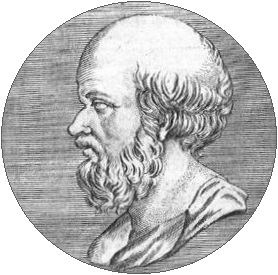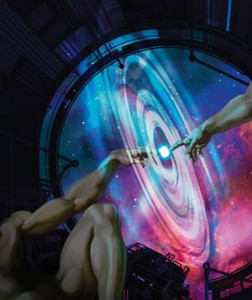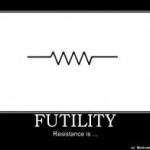In honor of Rob Skiba’s “having your cake and eating it too” position of being a “questioning globalist” while maintaining a website The Flat Earth Theory dedicated to popularizing intellectually bankrupt flat earth theories, I would like ask him a new question. In fact, the question is directed to all who question the spherical shape of the earth.
 How can an airplane like the Rutan Model 76 Voyager fly without refueling or stopping, in straight course and end up right where it started, if the earth is not a sphere? It’s been done many times now. That is the challenge, please use diagrams and mathematics to show how this is possible given your flat earth model. see
How can an airplane like the Rutan Model 76 Voyager fly without refueling or stopping, in straight course and end up right where it started, if the earth is not a sphere? It’s been done many times now. That is the challenge, please use diagrams and mathematics to show how this is possible given your flat earth model. see
Correction: the course was not perfectly straight, rather the navigated around mountains and whatnot but the heading was still relatively straight. Here is the exact course (which still falsifies a flat earth):
Guess what? It had already been done back in 1949, traveling straight without landing once, but they refueled in the air. The flight instrumentation is very precise and the pilots navigated a straight course around the globe, how so given a flat earth?
The first non-stop flight around the world was made by, again, a team of the US Air Force flyers in 1949. Taking off from Carswell Air Force base in Fort Worth, Texas on 26 February, Captain James Gallagher and a crew of 14 headed east in a B-50 Superfortress, called Lucky Lady II. They were refuelled four times in air by KB-29 tanker planes of the 43rd Air Refuelling Squadron, over the Azores, Saudi Arabia, the Philippines and Hawaii. The circumnavigation was completed on 2 March, having traveled 94 hours and 1 minute, covering 37 743 km (23,452 miles) at an average 398 km/h (249 mph). http://www.didyouknow.cd/aroundtheworld/flight.htm
Stems From Bad Biblical Interpretation
What makes this all the worse, is that proponents of flat earth belief attempt to use the Bible to support the false belief. I agree that some passages imply a flat earth with a dome over it. But teaching earth science was not the purpose of those passages. God used ancient human authors and ancient human language to convey a moral/theological message. The original authors had a lot of backward superstitious beliefs but God still used them because he was not teaching a scientific message to modern people. To rip scripture out of its ancient context in order to answer a modern scientific concern–that would have not even occurred to the original author–is an abuse.
The Bible is a collection of 66 books by over 40 authors over a period spanning 1400 BC to 90 AD. The meaning of scripture is what the original author intended for the original reader and it is our job as moderns to learn what that was. It was not written to 21st century people, it was written to ancient people in ancient Hebrew and Greek, so it is written for us but not to us. It was written to the ancient folks, so we must endeavor to understand it in its ancient context not impose our own. Using the Bible to determine a scientific question like the shape of the earth is abusing the Bible the same way skeptics do in order to dismiss its moral authority. It’s about theology and morality, not science.
Bad Science and Math
The earth was proven to be a sphere in around 170- 180 BC by Eratosthenes, a
Greek scholar that lived in 275-194 B.C. in Alexandria, Egypt. He invented the discipline of geography, including the terminology still used today. Please follow the links to learn about the incredible power of mathematics. God created a mathematically discernible reality that we can describe in equations. The rational intelligibility of the universe is one of the strongest evidences for intelligent design — creation was designed by a logical mathematical mind. Indeed, math is the language of creation, it is God’s language. If your beliefs do not agree with the math, you’re probably in error.
You can use high school level math and geometry prove the earth is a sphere for yourself. It’s not at all controversial.








